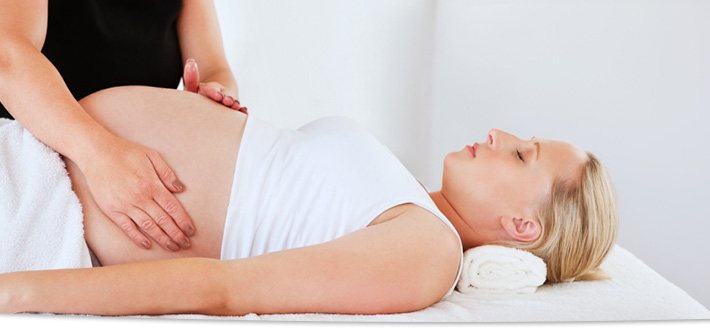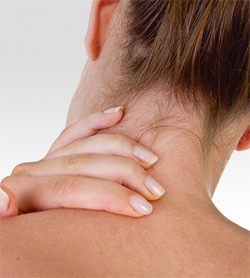Massage done by a professional at any time can relax and rejuvenate both, body and mind. Pregnancy massage shares similar goals of a regular massage to relax tense muscles, ease sore spots, improve circulation and mobility, and make you feel good, but is tailored specifically to the needs of pregnant women and their changing bodies. Therapists who are trained in prenatal massage know how to adjust the techniques accordingly.

All leg massage strokes should move toward the heart. Very light pressure on the abdomen is advised, if the belly is massaged at all. |
Examples of common types of massage include:
- Deep-tissue massage, with firm strokes pressing deep into muscles
- Swedish massage, with long strokes to muscles and attention to joint mobility
- Shiatsu, with pressure and tapping on acupressure points to stimulate the body’s natural energy (called qi)
Benefits of Massage
 Reduction of Stress Hormone: Research has shown, that regular massage treatments during pregnancy result in a reduction of stresshormones such as cortisol. At the same time blood serum levels of dopamine and serotonin were increased, relieving feelings of low mood anddepression.
Reduction of Stress Hormone: Research has shown, that regular massage treatments during pregnancy result in a reduction of stresshormones such as cortisol. At the same time blood serum levels of dopamine and serotonin were increased, relieving feelings of low mood anddepression.- Reduction of Swelling: Massage strengthens the circulatory and lymphatic system and therefore enhances the removal of tissue waste, such as fluid collection around swollen joints.
- Improvement of Nerve Pain: As the pregnancyprogresses the uterus gets heavier, increasing pressure on muscles of the pelvic floor and lower back. The pressure on these muscles can causesciatic nerve pain which spreads to the muscles of the upper and lower leg. Massage may help to address the inflamed nerves by releasing the tightness of nearby muscles.
- Reduced Back Pain: Lower back pain during their pregnancy is mostly due to the natural weight gain and the posture change shifting the center of gravity. Together with regular exercise such as yoga, massage can release the pain by loosening tight muscles and helping you to relax.
- Enhanced Breathing: Massage increases relaxation and therefore deepens the breathingnaturally. Deepened breathing in turn boosts the flow of oxygen that is supplied to your body and your baby at the same time it supports the elimination of toxins by stimulating the lymphatic system.
- A chance to enjoy a peaceful space: Having a pregnancy massage also allows you to enjoy a peaceful space where you can let go of worries either by talking about them or simply by relaxing the body and mind.
When to Avoid a Pregnancy Massage
There are a few situations in which massage may be risky.
 Avoid massage in an area where you have a blood clot or a bone fracture.
Avoid massage in an area where you have a blood clot or a bone fracture.- Avoid massage on any area where you have a skin injury or condition that could be aggravated by rubbing, including burns, open wounds, skin infections, or eczema.
- You’re experiencing nausea, vomiting, or morning sickness.
- Types of massage to avoid on the legs include deep-tissue massage, deep acupressure, shiatsu, cross-fiber friction, and percussive tapping.
- Many miscarriages happen in the first trimester, therefore some massage therapists and doctors counsel against first-trimester massage simply to avoid any potential liability issues should amiscarriage occur.
- You have a high-risk pregnancy such as placental abruption (where the placenta slightly detaches from the wall of the uterus) or preterm labor
- In case of an allergic reaction to oils used by massage therapists.
If you have any questions about whether a massage would be appropriate, ask your healthcare provider. Steer clear of hot tubs, saunas, and treatments such as hot wraps. These can make you overheat, which can cause problems for you and your baby.
Note: The National Center for Complementary and Alternative Medicine advises all pregnant women to consult with their doctor before trying massage.
Related Links
- Massage Therapy
- Healing Your Muscles
- The Foot: understanding zones and reflexes
- Top 10 Ways of Dealing with Stress
- Top 10 Yoga Exercises to Relieve Sciatica
- Living With Changes
Disclaimer
The Content is not intended to be a substitute for professional medical advice, diagnosis, or treatment. Always seek the advice of your physician or other qualified health provider with any questions you may have regarding a medical condition.